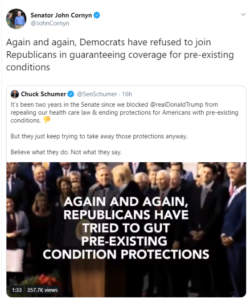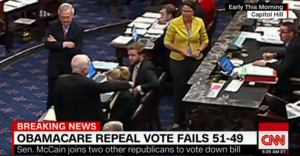“Senator Cornyn should immediately apologize to these families for trying to deceive them”
Washington, DC — In the latest outlandish lie to cover up their health care repeal and lawsuit, Senator John Cornyn (R-TX) blatantly fabricated an utterly false defense of the Republican opposition to protections for people with pre-existing conditions. Every reputable source has made clear that Republicans’ health care repeal agenda and their lawsuit to overturn health care would gut protections for people with pre-existing conditions. Protect Our Care chair Leslie Dach issued the following statement in response:
“This outrageous lie about pre-existing conditions is an insult to everyone with a pre-existing condition or a family member with asthma, diabetes, cancer or other diseases. Republicans in Washington like Senator Cornyn have voted repeatedly to repeal protections for pre-existing conditions, and the Trump administration is currently in court to do what they failed to do in Congress. Every one of the bills that Republicans say protected people, did not. Senator Cornyn knows the truth and so do the American people.
“Senator Cornyn should immediately apologize to these families for trying to deceive them. No one facing a serious or chronic illness should be lied to by their public officials. They deserve better.”
THE LIE:
THE FACTS:
IN THEIR OWN WORDS: KEY STAKEHOLDERS OPPOSE REPUBLICAN EFFORTS TO OVERTURN PRE-EXISTING CONDITION PROTECTIONS
American Cancer Society And Other Leading Patient Groups: Striking Down ACA Provisions Would Be “Catastrophic And Have Dire Consequences For Many Patients With Serious Illnesses.” “If either the plaintiffs’ or the administration’s position were adopted by the court, people with serious illness are likely to be denied coverage due to their preexisting conditions or charged such high premiums because of their health status that they will be unable to afford any coverage that may be offered. Without access to comprehensive coverage, patients will be forced to delay, skip, or forego care. Striking down these provisions would be catastrophic and have dire consequences for many patients with serious illnesses.” [American Cancer Society et. al, 6/14/18]
American Medical Association And Other Key Health Care Groups: “Invalidating The Guaranteed-Issue And Community Rating Provisions—Or The Entire ACA—Would Have A Devastating Impact On Doctors, Patients, And The American Health Care System As A Whole.” “The ACA’s ‘nationwide protections for Americans with pre-existing health conditions’ has played a ‘key role’ in allowing 3.6 million people to obtain affordable health insurance. Severing those vital insurance reforms would leave millions without much-needed insurance.” [AMA et. al, 6/14/18]
33 Leading Cancer Organizations Spoke Out Against GOP Repeal Bills: “The Senate’s BCRA, Just As The House’s AHCA, Is A Direct Threat To America’s 16 Million Cancer Patients And Survivors Who Rely On Timely And Uninterrupted Access To Comprehensive And Affordable Health Care.” “‘The Senate’s BCRA, just as the House’s AHCA, is a direct threat to America’s 16 million cancer patients and survivors who rely on timely and uninterrupted access to comprehensive and affordable health care,’ said NCCS CEO Shelley Fuld Nasso.” [NCSS, 7/13/17]



